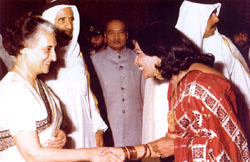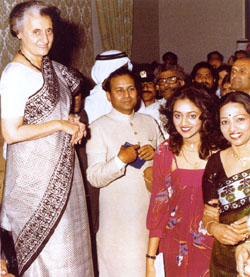Assassinated in 1984 by Sikh conspirators, the memory of India's first female prime minister, Indira Ghandi, lives on.
 She was a strong, determined woman whose political career did not always run smoothly. But though her actions caused controversy, she is remembered as a woman who cared deeply about the people of India. Her ability to ride the roll coaster of Indian politics for so long that makes her a still-revered figure today. Gandhi, Indira Priyadarshini, ne Nehru, was prime minister of India from 1966-1977 and from 1980-1984. Her controversial political career ended with her assassination by two security guards who were members of the Sikh religious group who were against Gandhi's government. "She was a great woman and a great statesman. She was also a very far sighted lady and a great administrator," says Consul and head of Chancery at the Indian Consulate in Dubai, KP Ram."She is still considered a great person by the Indian people today, respected by one and all."
She was a strong, determined woman whose political career did not always run smoothly. But though her actions caused controversy, she is remembered as a woman who cared deeply about the people of India. Her ability to ride the roll coaster of Indian politics for so long that makes her a still-revered figure today. Gandhi, Indira Priyadarshini, ne Nehru, was prime minister of India from 1966-1977 and from 1980-1984. Her controversial political career ended with her assassination by two security guards who were members of the Sikh religious group who were against Gandhi's government. "She was a great woman and a great statesman. She was also a very far sighted lady and a great administrator," says Consul and head of Chancery at the Indian Consulate in Dubai, KP Ram."She is still considered a great person by the Indian people today, respected by one and all."
Ram adds that Ghandi was a hard working woman whose life made a huge impact on the people of India. "She cared a lot about poor people and initiated many programmes to help them and improve literacy."
Ram adds that although women had been involved in Indian politics before she became prime minister, Ghandi really paved the way for female involvement at a high political level. "What the late Mrs Indira Ghandi has done for the women in India has set an example that women can play a role in politics nationally and internationally," says Ajay Bhatia, president of the Indian Association of the UAE and managing director of the Bhatia Brothers Group.
"She has broken the stigma. She did a tremendous job of controlling the world's largest democracy during difficult times. Her death was a tremendous loss to the nation and had an impact for India on the world stage - because at that time we did not have many experienced leaders who were trained under the able leadership of Pandit Jawaharlal Nehru," he adds.
But then, politics was always in her blood: she was born in Allahabad on November 19, 1917, in Allahabad, the only child of Jawaharlal Nehru, later the first prime minister of India. Ghandi spent her early years preparing for a future in politics. A graduate of Visva-Bharati University, Bengal, she also studied at the University of Oxford, England, where by all accounts she proved to be a brilliant, highly intelligent student and a formidable debater. In 1938 she joined the National Congress party and became active in India's independence movement. In 1942 she married Feroze Gandhi, a Parsi lawyer also active in the party. Shortly after, both were arrested by the British on charges of subversion and spent 13 months in prison. Ghandi did not let her time in prison dampen her enthusiasm for politics. And it did not cow her spirit. When she was eventually freed from captivity, she was more determined than ever to serve her country as a politician.
 When India won its independence in 1947 and Nehru took office as prime minister, Gandhi became his official hostess. (Her mother had died in 1936.) This was good training for Ghandi who learnt from a very early age what it is like to play a role in the public eye.
When India won its independence in 1947 and Nehru took office as prime minister, Gandhi became his official hostess. (Her mother had died in 1936.) This was good training for Ghandi who learnt from a very early age what it is like to play a role in the public eye.
Nehru relied on his brilliant daughter for companionship and comfort as well as political advice. He knew that she could be relied upon and his trust in her was absolute. She also served as his confidante on national problems and accompanied him on foreign trips. Ghandi was a single minded woman with strong opinions who devoted her life to bettering her country. In 1955 she was elected to the executive body of the Congress party, becoming a national political figure in her own right; in 1959 she became president of the party for one year. In 1962, during the Chinese-Indian border war, she coordinated civil defense activities.
Following the death of her father in May 1964, Gandhi became minister of
information and broadcasting in Lal Bahadur Shastri's government. In this post
she extended broadcasting time, liberalised censorship policies, and approved
a television education project in family planning.
When Shastri died suddenly in January 1966, Gandhi succeeded him as prime minister. The following year she was elected to a five-year term by the parliament members of the dominant Congress party. She led her party to a landslide victory in the national elections of 1971. She was a formidable woman who was prepared to fight against the odds to remain in power. In 1975 Gandhi was convicted of a minor infraction of the election laws during the 1971 campaign. Maintaining innocence, she charged that the conviction was part of an attempt to remove her from office and, instead of resigning, declared a national state of emergency on June 26.
Ghandi's actions were not always popular, but she determined that maintaining her vision for India, meant exerting strict control. Although her conviction was soon overturned by the Indian Supreme Court, the emergency was continued. Gandhi placed many aspects of life in India under her strict control, and thousands of dissenters were imprisoned.
Many saw in these actions the influence of her younger son, Sanjay Gandhi, a political neophyte on whom she relied more and more for assistance. Hoping to demonstrate popular support for her regime, which critics contended was undermining India's democratic system, Gandhi called a general election in March 1977; She lost her seat in parliament, and the Congress party was defeated. In the elections of January 1980, however, she made a spectacular comeback and was able to form a new majority government. But the Ghandi family has always been plagued by tragedy. When Sanjay died in a plane crash that June, she began grooming her older son, Rajiv Gandhi, as her successor. On October 31, 1984, after she had moved vigorously to suppress Sikh insurgents, she was shot to death by Sikh members of her security guard. Rajiv then served as prime minister until 1989. He was killed in a bombing at an election rally in Madras on May 21, 1991. Omana Menon, a former president of the Indian Ladies Association of Dubai says that what made Ghandi special was her ability to integrate her public and private life. In a piece written to commemorate Ghandi's visit to Dubai in 1984, (just before her death) Indira Ghandi - A Well Integrated Personality, Menom talks about what made Ghandi an exceptional politician and woman.
She was able to pack into her over crowded day a number of different matters and subjects without complicating or confusing the issues. According to one of the secretaries, Mrs Ghandi did not have separate times for doing different things. "She can attend to several different matters simultaneously without being distracted," says Menon.
"She may be discussing complex matters of government with a member of the cabinet and while doing so, she may be dandling her grandson on her knee; or she may be talking to friends when looking into an important file."
Menon goes on to say: "Mrs Ghandi once stated that she considered recreation and relaxation to be attitudes of mind and that she found recreation in whatever she was doing. Because of this positive attitude towards work she was able to organise her work and free time very efficiently, marshalling her physical and mental resources and faculties to the fullest extent."
Menon says that there is no doubt that Ghandi was an incredibly hard working woman. "Despite the crushing pace of her life, Mrs Ghandi has developed an incredible degree of resilience by which she finds time to enjoy her work and find peace at home. Politics and public life have taught her to find interest in ordinary things, beauty in any surroundings and light moments in the harshest of situations."
It's no surprise then that India's first female prime minister also pioneered the preservation of India's rich wild life and natural resources. She encouraged the government's involvement in various projects, aimed at protecting India's endangered tigers, increasing India's eight tiger reserves to 15.
In doing this she captured the attention of the public and can be said to have been at the forefront of nature conservation in the country. Ghandi was one of the first people to make the environment a political issue.
Ghandi was an avid magazine and book reader, says Menon. "At home she was very meticulous about tidiness and fully involved in the running of her home."
Menon says that one of the important things to remember about Ghandi is that "although she has been eulogised for being a woman holding the reins of a male dominated country, party and system, she always pragmatically avoided being labelled as a feminist."
Replying to the question: how does it feel to be a woman? in Mademoiselle Magazine in 1969, Ghandi replied "being a woman is to perceive the indignity and inequality which corrodes the human condition; to act with compassion and involvement to find solutions which are born of a fusion of the mind and heart; to ensure that, instead of confrontation and conflict, there is understanding and enrichment.